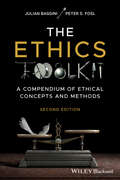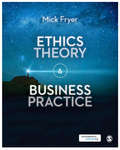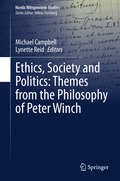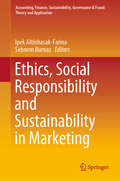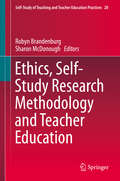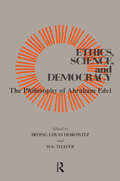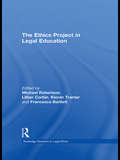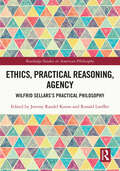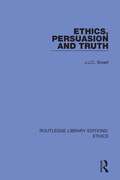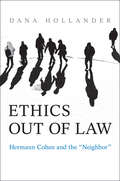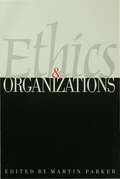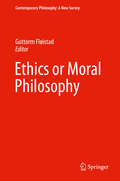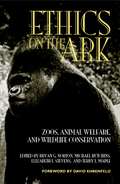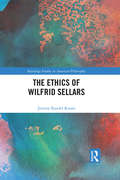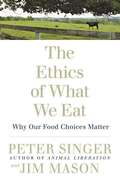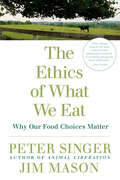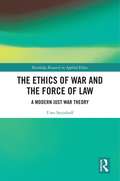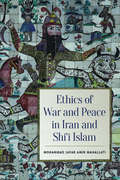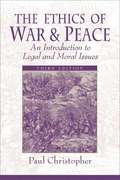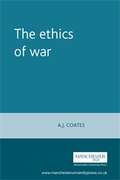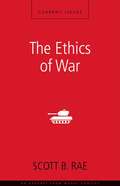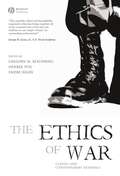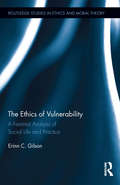- Table View
- List View
The Ethics Toolkit: A Compendium of Ethical Concepts and Methods
by Julian Baggini Peter S. FoslA new edition of the bestselling guide which equips readers with the skills necessary for engaging in ethical reflection The Ethics Toolkit offers an engaging and approachable introduction to the core concepts, principles, and methods of contemporary ethics. Explaining to students and general readers how to think critically about ethics and actually use philosophical concepts, this innovative volume provides the tools and knowledge required to engage intelligently in ethical study, deliberation, and debate. Invaluable as both a complete guide and a handy reference, this versatile resource provides clear and authoritative information on a diverse range of topics, from fundamental concepts and major ethical frameworks to contemporary critiques and ongoing debates. Throughout the text, Fosl and Baggini highlight the crucial role ethics plays in our lives, exploring autonomy, free will, consciousness, fairness, responsibility, consent, intersectionality, sex and gender, and much more. Substantially revised and expanded, the second edition of The Ethics Toolkit contains a wealth of new entries, new recommended readings, more detailed textual references, and numerous timely real-world and hypothetical examples. Uses clear and accessible language appropriate for use inside and beyond the classroom Contains cross-referenced entries to help readers connect and contrast ideas Engages both non-Western and Western philosophy Offer insights into key issues in ethics with a firm grounding in the history of philosophy Includes an appendix of tools for the practice of ethics, including links to podcasts, web and print resources, and prominent ethics organizations Written by the authors of the popular The Philosophers’ Toolkit, this new edition of The Ethics Toolkit is a must-have resource for anyone interested in ethics, from general readers to undergraduate and graduate students.
Ethics Theory and Business Practice
by Mick FryerIn his ground-breaking new textbook, Mick Fryer offers students of Business Ethics clear explanations of a range of theoretical perspectives, along with examples of how these perspectives might be used to illuminate the ethical challenges presented by business practice. The book includes: Realistic scenarios which gently introduce a theory and demonstrate how it can be applied to a real-life ethical dilemma that everyone can relate to, such as borrowing money from a friend Real organisational case studies in each chapter which illustrate how each theory can be applied to real business situations. Cases include Nike, Coca Cola, BMW, Shell, Starbucks and GSK ‘Pause for Reflection’ boxes and ‘Discussion Questions’ which encourage you to challenge the established notions of right and wrong, and empower you to develop your own moral code Video Activities in each chapter with accompanying QR codes which link to documentaries, films, debates and news items to get you thinking about real-life ethical dilemmas Visit the book’s companion website for self-test questions, additional web links and more at: study.sagepub.com/fryer
Ethics Theory and Business Practice
by Mick FryerIn his ground-breaking new textbook, Mick Fryer offers students of Business Ethics clear explanations of a range of theoretical perspectives, along with examples of how these perspectives might be used to illuminate the ethical challenges presented by business practice. The book includes: Realistic scenarios which gently introduce a theory and demonstrate how it can be applied to a real-life ethical dilemma that everyone can relate to, such as borrowing money from a friend Real organisational case studies in each chapter which illustrate how each theory can be applied to real business situations. Cases include Nike, Coca Cola, BMW, Shell, Starbucks and GSK 'Pause for Reflection' boxes and 'Discussion Questions' which encourage you to challenge the established notions of right and wrong, and empower you to develop your own moral code Video Activities in each chapter with accompanying QR codes which link to documentaries, films, debates and news items to get you thinking about real-life ethical dilemmas Visit the book's companion website for self-test questions, additional web links and more at: study.sagepub.com/fryer
Ethics, Society and Politics: Themes from the Philosophy of Peter Winch (Nordic Wittgenstein Studies #6)
by Michael Campbell Lynette ReidThis volume is a reappraisal of the work of Peter Guy Winch (1926 -1997), one of the most important philosophers of the 20th Century. Winch faded into relative obscurity compared to his contemporaries due to a mistaken belief that there are no systematic connections between the different aspects of his work. This volume corrects that presupposition and reintroduces Winch's work to a new generation of scholars. By showing how ethical, political and social issues are interrelated in Winch's work, and by making clear the connections between these issues and themes in metaphysics and the philosophy of mind, the volume demonstrates both the breadth and the unity of Winch's approach. It discusses topics such as ethics, political philosophy, social science, the philosophy of action, the philosophy of mind, metaphysics, and the philosophy of language. Despite this apparent variety of topics, the contributors to the volume share Winch's conviction that the different areas of philosophy are interdependent. As a result, the volume as a whole shows unity in diversity and provides an example of a manner of philosophising in which different approaches and sub-disciplines are placed in dialogue with each other. Peter Guy Winch is most famous for his early work on the philosophy of the social sciences. His On the Idea of a Social Science and its Relation to Philosophy (ISS) generated controversy within both philosophical and social scientific circles. In that work and subsequent publications Winch argued against the presupposition that social relations could be understood using the conceptual tools of the natural sciences. Winch would later describe ISS as a 'young man's book' and would come to regret the reputation it garnered him - a mixture of roughly equal degrees fame and infamy. Alongside his work on the philosophy of social sciences, Winch was an interpreter and exegete of Wittgenstein. He also published a ground-breaking study of the philosophy of Simone Weil, entitled Simone Weil: The Just Balance. Winch also published numerous essays on issues in ethics, political philosophy and the philosophy of religion, and at his death was working on a book manuscript on the problem of political authority.
Ethics, Social Responsibility and Sustainability in Marketing (Accounting, Finance, Sustainability, Governance & Fraud: Theory and Application)
by Ipek Altinbasak-Farina Sebnem BurnazThis book addresses the rising concept of 21st century societal marketing which entails that marketers should fulfill the needs of their target group in ways that enhance the well-being of a society as a whole. In the past, social responsibility and corporate ethics may not have been the key elements of corporate and business strategy. However, in the last decade the picture has changed dramatically. Consumers are more concerned about ethical issues and the effects of business activities on the environment and the society. The impact and importance of ethical consumerism is escalating. The consumers are more attentive and expect companies promote their ethical credentials in order to make them more accountable of their actions. This book also reveals how companies should realize that corporate social responsibility (CSR) is not an illustration of corporate altruism but a source of opportunity, and competitive advantage. Finding and following social initiatives as a part of the key business model is proved to be one of the competitive strengths in many instances. This book covers different issues related to ethics, social responsibility and sustainability in marketing and presents different cases and applications from different countries. Together with the best practices, each case and research is expected to shed light on how to improve the role of marketing in helping to the development and well-being of the society.
Ethics, Self-Study Research Methodology and Teacher Education (Self-Study of Teaching and Teacher Education Practices #20)
by Robyn Brandenburg Sharon McDonoughThis book examines the nuanced and situated experiences of self-study researchers. It explores the ways in which ethics are dynamic, idiosyncratic and require an ongoing ethical reflexivity. In addition, the book identifies, documents and collates the collective experiences of self-study researchers and sheds new light on the role and impact of ethics, ethical dilemmas and ensuing decisions for education researchers.The book considers the ethical dilemmas that self-study researchers in teacher education face, their careful ethical considerations while conducting research, and how they form their professional judgment and understanding of what it means to be an ethical self-study researcher. For self-study researchers, there are a number of ethical dilemmas and challenges that cannot be neatly captured by the frameworks and guidelines of an ethics board. For many, this requires researchers to be ever-present and re-engaged with the ethics of their own projects, from the development, through to the dissemination of their work.Readers will gain a deeper understanding of ethics, ethical perspectives and practices in the field of self-study research.
Ethics, Science, and Democracy: Philosophy of Abraham Edel
by Irving Louis Horowitz H. S. ThayerThis volume, modeled after those published in The Library of Living Philosophers, attempts to provide a coherent statement of the work of Abraham Edel in moral and political theory, and on the impact of his work on such diverse areas as education, law, and social science.
The Ethics Project in Legal Education (Routledge Research in Legal Ethics)
by Michael RobertsonThe contributions in this volume suggest that "the ethics project in legal education" is increasingly an international one. Even though the strength of commitment by both the profession and the legal academy to "ethics learning" within law schools varies, two fundamental questions confront all who work in this area. First, what is it that we want our students to learn (or, perhaps, in what manner do we want our students to develop) from the teaching of "legal ethics"? Second, how can we create a learning environment that will encourage the nature and quality of learning we think is important? All the contributors to this volume take a strong stand on the importance of ethical legal practice and the role of law schools in developing students’ capacities in this area. They share a belief in the essential need to encourage law students to engage with the moral dimensions of legal practice. The questions that these scholars grapple with are therefore not of the "should we be teaching this?" variety, but "how might we best to go about doing this, so that our efforts within law schools really make some difference?" Each of the chapters in this volume adds uniquely to our understanding of these matters.
Ethics, Practical Reasoning, Agency: Wilfrid Sellars’s Practical Philosophy (Routledge Studies in American Philosophy)
by Jeremy Randel Koons Ronald LoefflerThis is the first volume devoted exclusively to the practical philosophy of Wilfrid Sellars. It features original essays by leading Sellars scholars that examine his ethical theory, his theory of practical reasoning, and his theory of intentional agency. While most scholarship on Sellars’s philosophy has focused on his epistemology, metaphysics, or philosophy of language and mind, Sellars himself regarded his practical philosophy as central to his overall project of situating rational beings within the natural order. The chapters in this volume address this neglected area of Sellars’s philosophy. The chapters are divided into thematic sections covering Sellars’s theory of we-intentions – influential in contemporary debates on collective intentionality – naturalism and the manifest image, and the moral point of view. Together, they demonstrate how Sellars’s practical philosophy contributes to important debates in contemporary philosophy regarding, for example, expressivist approaches to moral thought and group agency in the collective intentionality literature. Ethics, Practical Reasoning, Agency: Wilfrid Sellars’s Practical Philosophy will appeal to scholars and advanced students interested in Wilfrid Sellars, American philosophy, and ethics.
Ethics, Persuasion and Truth
by J. J. SmartOriginally published in 1984, deals with meta-ethics – that is the semantics and pragmatics of ethical language. This book eschews the notions of meaning and analyticity on which meta-ethics normally depends. It discusses questions of free will and responsibility and the relations between ethics on the one hand and science and metaphysics on the other. The author regards ethics as concerned with deciding what to do and with persuading others – not with exploring a supposed realm of ethical fact.
Ethics Out of Law: Hermann Cohen and the “Neighbor”
by Dana HollanderHermann Cohen (1842–1918) was a leading figure in the Neo-Kantian philosophical movement that dominated European thought before 1918. He is also the inaugural figure for what is meant by "modern Jewish philosophy" in the twentieth and twenty-first centuries. This book explores Cohen’s striking claim that ethics is rooted in law – a claim developed in both his philosophical ethics and his philosophy of Judaism, in particular in his writings on "love-of-neighbor," up to and including his well-known Religion of Reason. Dana Hollander proposes that neither Cohen’s systematic philosophy nor his "Jewish" philosophy should be seen as the dominant framework for his oeuvre as a whole, but that his understanding of key philosophical questions takes shape in the passages between both corpuses, a trait that could be seen as paradigmatic for modern Jewish philosophy. Ethics Out of Law taps into one of the prime topics of current interest in the field of Jewish philosophy: the nature of Jewish political existence and the changing configurations of "law" that this entails.
Ethics & Organizations
by Martin ParkerEthics and Organization provides a rich and valuable overview of an increasingly important issue for management and organizations in contemporary society. Debates about equal opportunities, environmental responsibility, consumer redress and corporate governance have given ethics a prominent place in the study of organizations in their social and natural environments. Within the organization, new management styles that seek to energize employees by manipulating their beliefs have highlighted the moral-ethical principles at issue in contemporary management. At the same time debates around postmodernism and relativism have moved ethics to a new centrality in contemporary social theory. Ethics and Organization addresses the questions that these and other developments raise for the study of management and organizations, from a multidisciplinary perspective. The book will be of value to advanced level students and academics engaged in analyzing the moral, political and ethical dimensions of organization theory and organizational practice.
Ethics or Moral Philosophy
by Guttorm FløistadThis volume examines a variety of philosophical approaches that seek to formulate practical guidelines or norms for human actions and behavior in different areas of society, including politics, cultural traditions, the environment, business management, architecture, and medicine. Written by a team of international authors, this volume features thirteen surveys. It begins with an exploration of ethics in politics and cultural traditions. From genocide to the unequal distribution of wealth, it examines many of the harms that currently affect societies throughout the world and considers a way that those in politics can follow to provide better care for all their populations. Next, the book looks at the relation between ethics and cultural traditions. It features a paper that examines the tension that often exists between the past and the present, with a special focus on the history of India. This volume also considers the idea of a universal system of ethics, presents a practical approach to value-based management in private and public organizations, and examines ethics in medicine. In addition, this volume includes coverage of a new type of ethics called Eco-ethica, proposed by the Japanese philosopher Tomonobu Imamichi, which seeks to answer the question of how men and women can "live better" or "live together with each other" in a systematized, technological age.
Ethics on the Ark: Zoos, Animal Welfare, and Wildlife Conservation
by Terry Maple Elizabeth Stevens Michael Hutchins Bryan G. NortonEthics on the Ark presents a passionate, multivocal discussion--among zoo professionals, activists, conservation biologists, and philosophers--about the future of zoos and aquariums, the treatment of animals in captivity, and the question of whether the individual, the species, or the ecosystem is the most important focus in conservation efforts. Contributors represent all sides of the issues. Moving from the fundamental to the practical, from biodiversity to population regulation, from animal research to captive breeding, Ethics on the Ark represents an important gathering of the many fervent and contentious viewpoints shaping the wildlife conservation debate.From the Trade Paperback edition.
The Ethics of Wilfrid Sellars (Routledge Studies in American Philosophy)
by Jeremy Randel KoonsWilfrid Sellars’s ethical theory was rich and deeply innovative. On Sellars’s view, moral judgments express a special kind of shared intention. Thus, we should see Sellars as an early advocate of an expressivism of plans and intentions, and an early theorist of collective intentionality. He supplemented this theory with a sophisticated logic of intentions, a robust theory of the categorical validity of normative expressions, a subtle way of reconciling the cognitive and motivating aspects of moral judgment, and much more—all within a strict nominalism that preserves Sellars’s commitment to naturalism. The Ethics of Wilfrid Sellars offers the first systematic treatment of this sadly-neglected aspect of Sellars’s work, and demonstrates that his ethical theory—just like his more widely-discussed epistemology—has much to contribute to current debates.
The Ethics Of What We Eat: Why Our Food Choices Matter
by Peter Singer Jim MasonPeter Singer, the groundbreaking ethicist whom The New Yorker calls the most influential philosopher alive teams up again with Jim Mason, his coauthor on the acclaimed Animal Factories, to set their critical sights on the food we buy and eat: where it comes from, how it is produced, and whether it was raised humanely. The Ethics of What We Eat explores the impact our food choices have on humans, animals, and the environment. Recognizing that not all of us will become vegetarians, Singer and Mason offer ways to make healthful, humane food choices. As they point out: You can be ethical without being fanatical.
The Ethics of What We Eat: Why Our Food Choices Matter
by Peter Singer Jim MasonPeter Singer, the groundbreaking ethicist whom The New Yorker calls the most influential philosopher alive teams up again with Jim Mason, his coauthor on the acclaimed Animal Factories, to set their critical sights on the food we buy and eat: where it comes from, how it is produced, and whether it was raised humanely. The Ethics of What We Eat explores the impact our food choices have on humans, animals, and the environment. Recognizing that not all of us will become vegetarians, Singer and Mason offer ways to make healthful, humane food choices. As they point out: You can be ethical without being fanatical.
The Ethics of War and the Force of Law: A Modern Just War Theory (Routledge Research in Applied Ethics)
by Uwe SteinhoffThis book provides a thorough critical overview of the current debate on the ethics of war, as well as a modern just war theory that can give practical action-guidance by recognizing and explaining the moral force of widely accepted law. Traditionalist, Walzerian, and "revisionist" approaches have dominated contemporary debates about the classical jus ad bellum and jus in bello requirements in just war theory. In this book, Uwe Steinhoff corrects widely spread misinterpretations of these competing views and spells out the implications for the ethics of war. His approach is unique in that it complements the usual analysis in terms of self-defense with an emphasis on the importance of other justifications that are often lumped together under the heading of "lesser evil." It also draws on criminal law and legal scholarship, which has been largely ignored by just war theorists. Ultimately, Steinhoff rejects arguments in favor of "moral fundamentalism"— the view that the laws and customs of war must simply follow an immutable morality. In contrast, he argues that widely accepted laws and conventions of war are partly constitutive of the moral rules that apply in a conflict. The Ethics of War and the Force of Law will be of interest to scholars and advanced students working in just war theory, applied ethics, political philosophy, political theory, philosophy of law, and criminal and military law.
Ethics of War and Peace in Iran and Shi'i Islam
by Mohammed Jafar MahallatiNearly four decades after a revolution, experiencing one of the longest wars in contemporary history, facing political and ideological threats by regional radicals such as ISIS and the Taliban, and having succeeded in negotiations with six world powers over her nuclear program, Iran appears as an experienced Muslim country seeking to build bridges with its Sunni neighbours as well as with the West.Ethics of War and Peace in Iran and Shi'i Islam explores the wide spectrum of theoretical approaches and practical attitudes concerning the justifications, causes and conduct of war in Iranian-Shi'i culture. By examining primary and secondary sources, and investigating longer lasting factors and questions over circumstantial ones, Mohammed Jafar Amir Mahallati seeks to understand modern Iranian responses to war and peace. His work is the first in its field to look into the ethics of war and peace in Iran and Shi'i Islam. It provides a prism through which the binary source of the Iranian national and religious identity informs Iranian response to modernity. By doing so, the author reveals that a syncretic and civilization-conscious soul in modern Iran is re-emerging.
The Ethics of War and Peace: An Introduction to Legal and Moral Issues
by Paul ChristopherThe most important decision that nations make is whether to use force for political objectives. In a democracy, all responsible citizens feel the weight of such decisions.
The Ethics of War and Nuclear Deterrence
by James P. SterbaA selection of addresses, essays and lectures on the moral and ethical aspects of war and the strategy of deterrence.
The Ethics of War
by A. J. CoatesDrawing on examples from the history of warfare from the crusades to the present day, "The ethics of war" explores the limits and possibilities of the moral regulation of war. While resisting the commonly held view that 'war is hell', A. J. Coates focuses on the tensions which exist between war and morality. The argument is conducted from a just war standpoint, though the moral ambiguity and mixed record of that tradition is acknowledge and the dangers which an exaggerated view of the justice or moral worth of war poses are underlined.
The Ethics of War: A Zondervan Digital Short
by Scott RaeDerived from Scott B. Rae’s widely adopted textbook, Moral Choices, this digital short looks carefully at war in the Bible and at major Christian views on war, including pacifism, nonviolence and nonparticipation, and Just War theory. Not afraid to tackle hot-button issues like nuclear weapons and waterboarding, Rae also includes cases and questions for further discussion. The Ethics of Business thus provides a wise and well-grounded introduction to a key ethical question for Christians, namely, “Can I support or participate in war?”
The Ethics Of War: Classic And Contemporary Readings
by Gregory Reichberg Henrik Syse Endre BegbyThe Ethics of War is an indispensable collection of essays addressing issues both timely and age-old about the nature and ethics of war. Features essays by great thinkers from ancient times through to the present day, among them Plato, Augustine, Aquinas, Machiavelli, Grotius, Kant, Russell, and Walzer Examines timely questions such as: When is recourse to arms morally justifiable? What moral constraints should apply to military conduct? How can a lasting peace be achieved? Will appeal to a broad range of readers interested in morality and ethics in war time Includes informative introductions and helpful marginal notes by editors
The Ethics of Vulnerability: A Feminist Analysis of Social Life and Practice (Routledge Studies in Ethics and Moral Theory)
by Erinn GilsonAs concerns about violence, war, terrorism, sexuality, and embodiment have garnered attention in philosophy, the concept of vulnerability has become a shared reference point in these discussions. As a fundamental part of the human condition, vulnerability has significant ethical import: how one responds to vulnerability matters, whom one conceives as vulnerable and which criteria are used to make such demarcations matters, how one deals with one’s own vulnerability matters, and how one understands the meaning of vulnerability matters. Yet, the meaning of vulnerability is commonly taken for granted and it is assumed that vulnerability is almost exclusively negative, equated with weakness, dependency, powerlessness, deficiency, and passivity. This reductively negative view leads to problematic implications, imperiling ethical responsiveness to vulnerability, and so prevents the concept from possessing the normative value many theorists wish it to have. When vulnerability is regarded as weakness and, concomitantly, invulnerability is prized, attentiveness to one’s own vulnerability and ethical response to vulnerable others remain out of reach goals. Thus, this book critiques the ideal of invulnerability, analyzes the problems that arise from a negative view of vulnerability, and articulates in its stead a non-dualistic concept of vulnerability that can remedy these problems.
